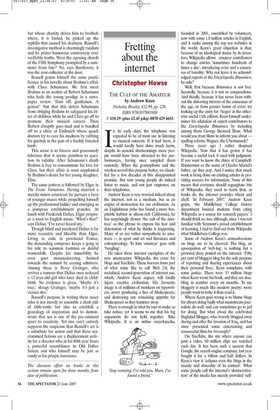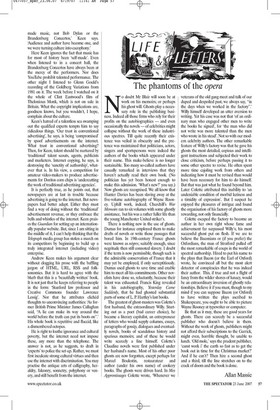Fretting about the internet
Christopher Howse THE CULT OF THE AMATEUR by Andrew Keen Nicholas Brealey, £12.99, pp. 228, ISBN 9781857883930 £1039 (plus £2.45 p&p) 0870 429 6655 1 n its early days, the telephone was expected to be of most use in listening to musical concerts. If it had been, it would hardly have done much harm, despite its acoustic shortcomings: more people would have been attracted to live performances, having once sampled them remotely. When the gramophone and the wireless served this purpose better, we chuckled for a few decades at this disappointed promise. But now young people do indeed listen to music, and not just ringtones, on their telephones.
Andrew Keen is very worried indeed about the internet, not as a medium, but as an engine of destruction for our civilisation. As an Englishman (who has found a more hospitable habitat in silicon-rich California), he has surprisingly chosen `the cult of the amateur' as the phrase to express his fear and detestation of what he thinks is happening. Many of us are rather sympathetic to amateurs — in sport and art and literature and coleopterology. To him 'amateur' goes with 'bungling'.
He takes three internet exemplars of the new amateurism: Wikipedia, the craze for blogs and YouTube. These horrors form part of what some like to call Web 2.0, the socialised, second-generation of internet use, which, Andrew Keen argues, will fatally injure creative civilisation. His favourite image is of millions of monkeys on typewriters, never producing a line of Shakespeare, and destroying any remaining appetite for Shakespeare as they hammer away.
There is enough in what he says to make us take notice, yet it seems to me that his big arguments do not hold together. Take Wikipedia. It is an online encyclopedia, founded in 2001, assembled by volunteers, now with some 1 8 million articles in English, and it ranks among the top ten websites in the world. Keen's great objection is that, because of an ideological stance by its inventors, Wikipedia allows amateur contributors to change entries 'sometimes hundreds of times a day', introducing error and a consensus of banality. Why not leave it to acknowledged experts at the Encyclopedia Britannica, he asks?
Well, first because Britannica is not free. Secondly, because it is not so compendious. And thirdly, because it has never been without the distorting mirrors of the consensus of the age, or from grosser forms of error: try looking up the entry for 'Negro' in the otherwise useful 11th edition. Keen himself undermines his adulation of expert contributors to the Encyclopedia Britannica by including among them George Bernard Shaw. What would you trust Shaw to inform you about — spelling reform, Wagner, the Ubermensch?
Three years ago I rather despised Wikipedia. Now that it has grown it has become a useful tool, if used with judgment. If you want to know the dates of CampbellBannerman or the name of Charles Martel's father, up they pop. And I notice that much work is being done on existing articles in providing sources for information. None of this means that everyone should regurgitate bits of Wikipedia; they need to learn that, as books do, the internet provides wheat and chaff. 'In February 2007,' Andrew Keen gasps, `the Middlebury College history department banned students from citing Wikipedia as a source for research papers.' I should think so, too, although, since I was not familiar with Vermont's proud establishment of learning, I had to find out from Wikipedia what Middlebury College was.
Some of Andrew Keen's animadversions on blogs are to be cheered. The blog, an apocopation of `web-log', is nothing but a personal diary posted on the internet. 'Fifty per cent of bloggers blog for the sole purpose of reporting and sharing experiences about their personal lives,' Keen complains, with some justice. There were 53 million blogs when Keen wrote his book, and they are doubling in number every six months. To me bloggery is much like modern poetry: more people want to write it than read it.
Where Keen goes wrong is to blame blogs for always doing badly what mainstream journalists do well, and can sometimes go to jail for doing. But what about the celebrated Baghdad Blogger, who bravely blogged away during and after the invasion of Iraq, and has since presented some entertaining and resourceful films for Newsnight?
On YouTube, the site where anyone can post a video, 60 million clips are watched each day. It has been such a success that Google, the search-engine company, last year bought it for a billion and half dollars. In Keen's view it 'eclipses even the blogs in the inanity and absurdity of its content'. What some people call the internet's 'democratisation' of the media has merely provided 'selfmade music, not Bob Dylan or the Brandenburg Concertos,' Keen says. 'Audience and author have become one, and we were turning culture into cacophony.'
Here Keen ignores the fact that music has for most of history been 'self-made'. Even when listened to in a concert hall, the Brandenburg Concertos have always been at the mercy of the performers. Nor does YouTube prohibit talented performance. The other night I listened to Glenn Gould's recording of the Goldberg Variations from 1981 on it. The week before I watched on it the whole of Clint Eastwood's film of Thelonious Monk, which is not on sale in Britain. What the copyright implications are, goodness knows, but you wouldn't, I hope, complain about the culture.
Keen's hatred of a talentless sea swamping out the qualified experts tempts him to say ridiculous things 'Our trust in conventional advertising', he says, is being 'compromised' by spoof advertisements on the internet. What trust in conventional advertising? Then, for Keen, talent should be nurtured by 'traditional' talent scouts, agents, publicists and marketers. Internet copying, he says, is destroying the 'sanctity of authorship', whatever that is. In his view, a competition for amateur video-makers to produce advertisements for Doritos corn chips is 'undercutting the work of traditional advertising agencies'.
It is perfectly true, as he points out, that newspapers are at last in trouble because advertising is going to the internet. But newspapers had better adapt. Either they must find a way of doing without the 'traditional' advertisement revenue, or they embrace the bells and whistles of the internet. Keen praises the Guardian for setting up an internationally popular website. But, since I am sitting in the middle of it, I can't help thinking that the Telegraph media group has stolen a march on its competitors by beginning to build up a truly integrated internet (including video) enterprise.
Andrew Keen makes his argument clear without clogging his prose with the baffling jargon of HTML, URL, RSS and folksonomies. But it is hard to agree with the blurb that this is a 'beautifully written' book. It is not just that he keeps referring to people in the form: 'Stanford law professor and Creative Commons founder Lawrence Lessig'. Nor that he attributes cliched thoughts to unconvincing authorities: 'As former British Prime Minister James Callaghan said, "A lie can make its way around the world before the truth can put its boots on".' His whole book is repetitive and flaccid, like a dismembered octopus.
He is right to loathe ignorance and cultural poverty, but the internet need not impose these, any more than the telephone. The answer is not, as he suggests, to draft in 'experts' to police the set-up. Rather, we must first inculcate strong cultural virtues and then use the internet with discrimination. You may practise the antique arts of calligraphy, heraldry, falconry, sonnetry, polyphony or venery, and still benefit from the internet.






























































 Previous page
Previous page